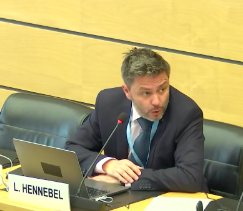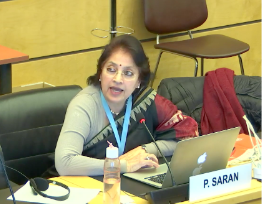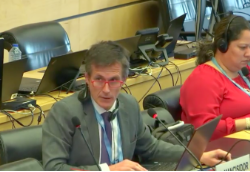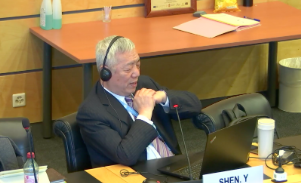73rd Session of the Committee on the Economic, Social and Cultural Rights
Review of Yemen
27 February to 3 March 2023

By Kiyana Newell and Frizia Rounak / GICJ
Executive Summary
During the 73rd session of the Committee of Economic, Social, and Cultural Rights (CESCR), the delegation of Yemen was questioned by UN experts about efforts made to prevent discrimination against minorities and women in both the private and public sector. Moreover, the committee discussed the need to protect children from exploitation and abuse, remedy food and water insecurity, limit interference in the distribution of humanitarian aid, and generally protect citizens from the impact of the ongoing conflict with the Houthi terrorists.
Geneva International Centre for Justice (GICJ) recognises the challenges the legitimate government currently faces, but stresses that there is tremendous work that must be done in order to remedy one of the worsening humanitarian crises in Yemen. We are concerned specifically about the extent to which the Yemen government can adequately fulfil the economic, social, and cultural rights of women, children, and minorities in liberated territories. The efforts made are not enough under the current conflict and demand stronger initiatives.
Background
The Committee of Economic, Social and Cultural Rights (CESCR) was established in May 1985 under the Economic and Social Council (ECOSOC) Resolution 1985/17. Per articles 16 and 17 of the Covenant, state parties are required to submit how economic, social, and cultural rights are being implemented within the country. In addition, representatives must be able to engage in an interactive dialogue and reply to questions given by the committee members.
During the 73rd session, Yemen submitted its third periodic review, which acknowledged the challenges faced in ensuring human rights protection as a result of the prolonged conflict between the UAE backed Yemeni government and the Houthi group. There is yet to be an efficient system from the legitimate government that can process statistical data concerning human rights. Current government institutions are notably lax about filing or archiving resulting in loss of information.
Interactive Dialogue
Articles 1-5
The UN expert, Ludovic Hennebel, thanked the delegation of Yemen for resuming the constructive interactive dialogue and the stakeholders for providing information and sharing their insight through their reports. Hennebel recognises that the situation in Yemen is complex and he understands the challenges in implementing economic, social, and cultural rights within the country.
sharing their insight through their reports. Hennebel recognises that the situation in Yemen is complex and he understands the challenges in implementing economic, social, and cultural rights within the country.
Regarding the ministry for legal affairs and human rights, Hennebel asked the delegation what measures have been taken to strengthen this ministry and to increase its resources. More generally, he also asked what measures have been taken to promote the issues of this Covenant domestically and what the government contributed to the loss of territory regarding the Covenant, including tools to control corruption and regulate businesses. Additionally, L. Hennebel asked what measures have been adopted by the Yemen government to bring an end to the interference of humanitarian aid and to ensure victims are provided with said aid, including medicines and other provisions to aid in humanitarian work. Moreover, he questioned the delegation as to whether or not the Yemeni government has subjected humanitarian aid defenders to violence or intimidation.
Concerning discrimination, L. Hennebal asked the Yemen delegation what measures the state have made to combat poverty and what measures have been taken to combat discrimination against journalists, women, children, minority groups, immigrants, displaced persons and persons belonging to the lgbtqi+ community. In addition, what measures is the state taking to fight discrimination and stigmatisation on the ‘Al- Muhamasheen’ regarding social aid and access to justice? L. Hennebel was curious to know if the abolishment of capital punishment is under discussion, especially regarding the Muhamasheen and lgbtq+ community.
Responses to Articles 1-5
The delegation responded to the concern about Yemen's capacity to remedy human rights violations, by mentioning that the National Committee of Inquiry has made efforts to verify and collect data on human rights violations. Further, that members work on the ground daily and prepare reports providing data and working sessions in the territory. According to the delegation's knowledge, the committee has collected information on 24,000 cases. However, reports indicate that at the end of 2022, 17.8 million people do not have access to sanitation or drinking water.
Concerning judicial procedures in the country, the legitimate government has made some efforts to rehabilitate the courts and legal offices to share procedures regarding the work done to strengthen the legal system. There is a public prosecutor for the nation and dozens of judges working in appellate courts. The delegation claims that the judiciary operates at a “rate of 90 percent to 95 percent in all courts”. The public sector in the legitimate court and parts of the supreme judicial council have started rebuilding the courts' chambers.
Fighting poverty is part of an implementation program that the government has adopted. The Strategy focuses on providing employment, and the ministry of industry and commerce has a fund for supporting small and medium enterprises (SMEs) by providing grants and loans. The delegation believes that SMEs provide jobs for many people in Yemen. A conference will be held to provide strategies to help employ women.
The National Relief Committee in Yemen draws up policies and takes care of displaced persons, explained the delegation. This unit also provides legal protection for displaced persons and registers these persons through a database. In addition, the National Relief Committee is working on providing land for displaced persons by constructing camps, especially for those who lost land due to the war. These camps and shelters,however, are known to have inadequate shelter conditions and are often without essential household items.
The delegation reminded UN experts that Article 24 of Yemen’s constitution declared the right of all citizens, including the Muhamasheen, to political, economic, social, and cultural rights. Yemen had drafted a National Strategy for the Empowerment of Women first adopted in 2003, but the Strategy ended in 2016. However, it is still being determined what more the legitimate government has done or can do to ensure minorities and women are not discriminated against.
The delegation explained that women receive 20 days of maternity leave during the pregnancy. In addition, there are provisions for women to leave the workplace if they have a difficult birth. But, again, it needs to be clarified what those provisions are and if they are implemented in the workplace. On the economic front, women have contributed to a National Strategy of 2023 that plans to improve women's economic, social, and cultural status by strengthening their economic empowerment.
Articles 6-9
 UN expert, Preti Saran, was given the floor to ask questions regarding Articles 6-9 of the Covenant. She asked the delegation what steps have the state body taken to strengthen the agriculture sector and implement an updated national employment plan. Again, it was asked what the state body has done to provide opportunities for the Muhamasheen to work and a fair wage. Since 2016, government workers have not received a full salary, P. Saran is concerned about what measures the government has made to provide salaries to all workers in Yemen.
UN expert, Preti Saran, was given the floor to ask questions regarding Articles 6-9 of the Covenant. She asked the delegation what steps have the state body taken to strengthen the agriculture sector and implement an updated national employment plan. Again, it was asked what the state body has done to provide opportunities for the Muhamasheen to work and a fair wage. Since 2016, government workers have not received a full salary, P. Saran is concerned about what measures the government has made to provide salaries to all workers in Yemen.
Responses to Articles 6-9
70 percent of Yemen's population depends on the agriculture sector. Given the war, the delegation expressed that the Houthi militia have planted landmines, therefore, displacing 40 million people from their homes. Resultantly, agricultural output has been impacted and there have been efforts made to return workers in this sector to their homelands, according to the delegation. Regarding fishing, the Yemeni government has had to deal with maritime landmines as well, causing fishermen to fear going to work. Natural disasters are another challenge workers have to face when
The delegation stated that in 2012 the government had a program to address the issue of citizens losing their jobs because of the conflict. Even so, “the problem is still there”, said the delegation and since 2011 there has been no addition to government jobs. However, the delegation mentioned that there are opportunities for jobs in the public sector for women and the Muhamasheen.
In response to questions about child labour, the Yemen government regulated the hours worked for those under the age of 18 and 14 -18 in 2013. The Yemen government has noticed children have been used to sprinkle pesticides and pick fruits and stated that children either work part-time or work after school. The delegation did mention that the children are exposed to danger. Currently 17 areas use illegal pesticides and there have been orders to close those facilities which engage in this practice. Regarding fishing, if children are working on a boat, the boat owner has to sign a document that stipulates the full protection of the child.
Under the Houthi-controlled areas, families are coerced into letting children work instead of attending school. In those situations, children are also recruited into the Houthi militia.
The Central bank has been moved to Aden by presidential decree. The Houthi militia have used all of the currency reserves hence why the Central Bank was moved to the temporary capital. In 2019, 50,000 government employees received their salaries and there has been a procedure to ensure payment to those under Houthi control, stated the delegation. However, this procedure requires civil servants to travel to Aden which produces hardships such as passing through militarised checkpoints. The delegation did not provide alternatives to make sure citizens are paid without hardships.
Articles 10-12
Mr. M. Mancisidor began this cluster by shedding light on two issues: firstly, he stated that most questions under this cluster had already been addressed throughout the prior dialogues on the right to food, agriculture, and children’s welfare, however, he requested for further elaboration on some of these areas. Secondly, he requested that the delegation provide more concrete answers to the committee as they are looking for tangible political commitments shouldered by the government on clear-cut procedures that have been adopted or will be adopted in the future, and the results yielded by measures already adopted. These, he stated, are necessary to identify and provide concrete recommendations to the government.
prior dialogues on the right to food, agriculture, and children’s welfare, however, he requested for further elaboration on some of these areas. Secondly, he requested that the delegation provide more concrete answers to the committee as they are looking for tangible political commitments shouldered by the government on clear-cut procedures that have been adopted or will be adopted in the future, and the results yielded by measures already adopted. These, he stated, are necessary to identify and provide concrete recommendations to the government.
Article 10 of the ICESCR, emphasises the need to “provide protection and assistance to families, the natural and fundamental group unit of society”. The first query of the committee pertained to the government's executive administrative measures to combat child marriage, despite facing limitations in the parliament. The second question focused on child labour, particularly whether Article 248 of the civil code provides adequate protection, and what specific executive measures are being taken to prevent child labour in the country. The third question concentrated on the recruitment of children in armed groups, particularly in territories controlled by the government, and the government's efforts to reintegrate former child soldiers into society. Lastly, the fourth question concerned birth registration, and the government's current endeavours to facilitate registration. The committee requested additional statistical information to evaluate the extent of the problem.
Article 11 ensures the “right of everyone to an adequate standard of living” and various questions were asked under this article regarding the government's commitment to ensuring access to food and water in the areas under its control, including what concrete political commitments and administrative measures are being taken to prevent attacks on humanitarian staff and hampering of aid. Statistical information was also requested on projects and initiatives developed by the government and international agencies to provide facilities for families to recover their land and crops and have access to tools, seeds, and fertilisers. Additionally, the delegation was questioned about the government’s policies and achievements in terms of land titling and giving people access to land ownership, particularly for those displaced by COVID-19.
Article 12 of the ICESCR “recognizes the right of everyone to the enjoyment of the highest attainable standard of physical and mental health”. The questions pertaining to this article covered a range of issues related to healthcare in Yemen, including the rehabilitation of damaged health facilities, treatment for victims of war, sexual and reproductive rights, access to medicine, and vaccination coverage against COVID-19. The delegation was asked about its measures, projects, and practices to address these issues and provide health services to those in need, including people with special needs, pregnant women, adolescents, and those affected by corruption. The government was also asked to provide information on the percentage of persons vaccinated against COVID-19 and their plans to increase vaccination coverage.
Responses to Articles 10-12
In their response to questions under Article 10, the Yemeni delegation stated that in the absence of a legal text and parliamentary sessions due to the ongoing civil war, several measures and procedures had been established through the national commission in charge of women's affairs to combat early marriages. For instance, a budget has been set aside to provide assistance to Yemeni society, civil society, and women-led organisations to raise awareness about the negative consequences of early marriage and to encourage young girls to pursue education or professional training. They noted the disproportionate effects the war and forced displacement have had on some parts of society to resort to early marriage due to poverty and economic challenges, however, the government is working on awareness-raising campaigns to educate society on the physical and moral consequences of early marriage and to provide assistance through civil society organisations (CSO). They also noted that abuses can lead to the annulment of a marriage or prosecution of those responsible.
Vulnerable children who work in the agricultural sector, are often exposed to harmful practices, pesticides, et cetera which can not only result in dire health consequences, but also take away their opportunity to receive an education and their right to a childhood. Answering questions under Article 11, the government stated that they have taken steps to protect children who have been subjected to these dangers, including moving them away from the affected areas and creating curricular and school programs that discourage children's involvement in these activities. The government has also launched awareness campaigns aimed at children to avoid the negative effects of such activities. As vulnerable groups, special attention must be given to children who participate in the agricultural sector, especially those living in regions under Houthi militia control. The government is committed to raising awareness among all children to ensure their safety and well-being.
In response to questions regarding the recruitment of children in armed groups, the delegation noted that the Yemeni government adopted a resolution in 2018 to promote human rights and prevent child recruitment, leading to the establishment of a joint committee with the United Nations. The committee implemented measures such as establishing 80 focal points and conducting training sessions to prevent child recruitment, focusing on awareness raising. There were also directives to identify and scrutinise recruitment cases, with cases referred to the child protection unit. Additionally, efforts were made to rehabilitate children who were recruited.
Further, regarding the birth registration of Yemenis, the government provided brief statistics on the rate of child registration which remains a challenge, with only 70% of children registered in urban areas and 40% in areas controlled by the Houthis. The government is cooperating with hospitals and medical centres to address this issue, but statistics in 2020 show that 150,000 children in Aden alone are not registered. Despite these challenges, the Yemeni government is taking active steps to promote human rights and prevent child recruitment.
Questions on Article 12 by the Committee mostly focused on food insecurity issues, to which the government responded about the measures taken to ensure the delivery of food and alleviate the food needs of Yemeni citizens. The Ministry of Industry and Commerce identified five main commodities and stated that they have tried to reduce prices and customs duties on milk and medicines. They also continue to provide subsidies and support for food, and there are projects to facilitate off-loading ships at ports. The government distributes food to beneficiaries, and the ministry has facilitated humanitarian assistance delivery to areas in need. Cooperating with the UN agencies and humanitarian organisations is of the utmost importance to facilitate their work. The Committee also raised concerns about the rising khat plantation in Yemen, however, according to the Yemeni government, the Committee did not mention it in their report. With that said, the government is promoting investments in agricultural products to replace khat and has special plans to promote fishing activities in the fishing sector. As statistics, the government states that provinces such as the Abyan province do not face challenges arising from khat plantation, and in other provinces, the government is promoting investment in agricultural products to replace khat.
The Yemeni delegation acknowledges that the country is going through a difficult time, particularly in terms of health services, which were severely affected by the COVID-19 pandemic. Despite these challenges, Yemen has made efforts to mitigate the situation through the Ministry of Health, in cooperation with international bodies, and has recovered healthcare services through mobile and regional centres with a focus on prevention and vaccination campaigns. The government has also provided appropriate medicines and equipment to healthcare centres and trained medical staff with the necessary knowledge. Around a million citizens have been vaccinated, free of charge, including those in remote areas, villages, and health facilities. However, corruption remains a challenge in the provision of medical assistance, which requires a multi-sectoral approach in cooperation with the international community.
Articles 13-15
Articles 13, 14, and 15 of the ICESCR recognise everyone’s right to education, encourage countries that are party to the covenant to provide compulsory primary education free of charge in its territory, or create and adopt a plan within two years to implement the principle of free compulsory education for all within a reasonable period of time; and recognises the right of everyone to participate in cultural life and enjoy the benefits of scientific progress and its applications respectively.
 Mr. Shen Y. began this cluster by first expressing his condolences for the ongoing war in Yemen, but reminded the state party of its obligation to implement the covenant's provisions. He highlighted the severity of the situation, with millions of children unable to attend school due to poverty, lack of teachers, and other factors and also recognised measures taken by the Yemeni government to address these issues, such as endorsing the safe declaration and adopting the Convention on Protection of Cultural Science in Armed Conflict. However, more action is needed as the current measures are not enough given the seriousness and scale of the problems. The government is encouraged to take further steps to address these issues, such as organising training courses, prohibiting the recruitment of children into the armed forces, and adopting decrees and regulations against violators of human rights.
Mr. Shen Y. began this cluster by first expressing his condolences for the ongoing war in Yemen, but reminded the state party of its obligation to implement the covenant's provisions. He highlighted the severity of the situation, with millions of children unable to attend school due to poverty, lack of teachers, and other factors and also recognised measures taken by the Yemeni government to address these issues, such as endorsing the safe declaration and adopting the Convention on Protection of Cultural Science in Armed Conflict. However, more action is needed as the current measures are not enough given the seriousness and scale of the problems. The government is encouraged to take further steps to address these issues, such as organising training courses, prohibiting the recruitment of children into the armed forces, and adopting decrees and regulations against violators of human rights.
The committee enquired about the number and location of schools being used for military purposes and the government's response to such cases. They also asked about the government's priorities in education and measures taken to ensure that teachers receive salaries, rebuild damaged schools, and provide basic facilities such as water and sanitation. The committee was interested in the enrollment rate and temporary measures taken to ensure that students affected by war can continue their education. Additionally, questions about human rights education to promote gender equality, ethnic and religious tolerance, and prevent conflicts in the future were also asked. Finally, the committee expressed concern about the use of educational institutions, cultural facilities, and heritage sites for military purposes and asked about measures to prevent further deterioration of the situation and promote the application of science among the Yemeni people.
Responses to Articles 13-15
The Ministry of Education provided a collective answer to all questions pertaining to the right to education for all. He discussed various initiatives and laws that aim to ensure the right to education for all, and the government's commitment to achieving sustainable development goal 4, which strives to ensure inclusive and equitable quality education and promote lifelong learning opportunities for all. The concrete measures taken by the government to ensure access to education include laws on literacy, higher education, and community universities and colleges. The government has opened schools for compensatory education centres for literacy. The devastating effects of war have left many educational institutions in ruins, with some still occupied, and government education budgets reduced. Despite a previous strategy to build 7000 classrooms per year, the government still needs 57000 classes to meet demand. The latest survey revealed that over 5 million students are enrolled in schools, with over 3 million being female. However, more than 140,000 teachers have not received salaries, and only 18000 schools are operational, including 89 government schools. To address this shortage, 1700 schools have received support from education partners, with 102 new classes added, 36 buildings constructed, and 900 maintenance cases completed. The MOE has provided school books, curricula, and school bags to students, even those not enrolled in schools, and supports over 22,000 children and more than 700,000 students, including over 300,000 females. Additionally, the government has provided documents to displaced students who lost their identity cards. Despite these efforts, building more schools remains a priority for the government.
The destruction of cultural heritage sites and property by the Houthis has impacted Yemen's cultural field, with the trafficking of cultural heritage used to finance Houthi activities. The Yemeni government has collaborated with several organisations such as the Arab Coalition who have attempted to put an end to bombing attacks, and the government has taken various measures to combat the pillaging, including establishing lists of protected cultural sites and artefacts. Yemen has implemented a framework to collect resources and support museums in protecting their cultural heritage. Several artefacts have already been transferred to Geneva, and the government is collaborating with academic institutions and civil society organisations to monitor and safeguard heritage sites. UNESCO has prohibited the illegal trading of artefacts, and Yemen has developed a plan to uphold the 1995 cultural heritage plan. The government has received 77 artefacts that were illegally removed from Yemen and will be repatriated. Training has also been offered to museum persons to safeguard cultural heritage, and Interpol is coordinating with Yemen on border control to prevent the trafficking of artefacts. A national body is also being established to combat the illicit transfer of artefacts from museums. In Socotra island, a project is underway in cooperation with the UK and UNESCO to safeguard the natural heritage.
Geneva International Centre for Justice (GICJ) commends Yemen for its positive engagement in the review process and recognises the challenges the legitimate government has to face. However, as human rights continue to deteriorate in the country due to the conflict, there is tremendous work that still needs to be done to remedy one of the worst global humanitarian crises.
We are concerned specifically about the extent to which the Yemen government can adequately safeguard the economic, social, and cultural rights of women, children, and minorities in liberated territories. The efforts made are not enough under the current conflict as children are still prevented from enjoying their right to childhood due to a lack of rehabilitation options for previously recruited children, and the existing educational and humanitarian aid inequalities in society among the rural and urban residents. The current war cannot be used as a basis for discriminatory actions or outcomes.
GICJ supports Yemen’s efforts to address these inequalities through changes in state educational or criminal policy, economic support to groups in need, and all its other efforts to ensure the full enjoyment of economic, social and cultural rights by all residents of Yemen.
Keywords : ICESCR, Yemen, humanitarian assistance, economic rights, cultural rights, social rights, United Nations, Houthi Militias, right to education, SDG4, right to health, agriculture, human rights







